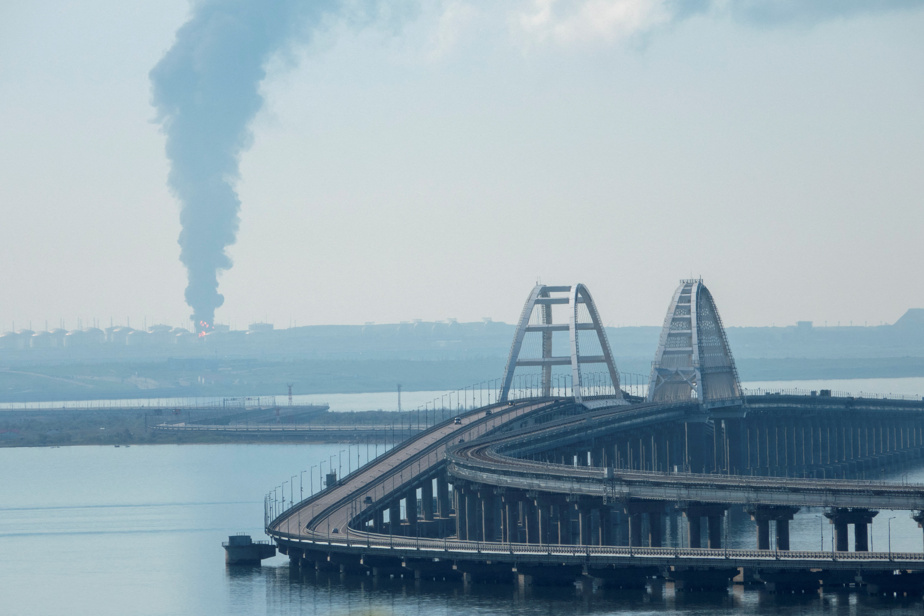(Moscow) The multiplication in recent days of attacks and acts of “sabotage” in Russia raises fears that the military celebrations of May 9, essential for the Kremlin in the midst of the conflict in Ukraine, will be spoiled.
In recent days, a series of spectacular incidents have served as a reminder that Russia is exposed to enemy blows, even hundreds of kilometers from the Ukrainian front.
On Monday and Tuesday, “explosive devices” derailed two freight trains in a border region of Ukraine, incidents never before reported in Russia since the start, on February 24, 2022, of the offensive against Kyiv and awakening the memory of the “battle of the rails” of the Second World War.
Also on Monday, much further from Ukraine, a power line near a village south of Saint Petersburg (northwest) was damaged by an explosive device, according to the security services (FSB) which opened a investigation for “sabotage”.
And overnight from Tuesday to Wednesday, a fuel depot caught fire in a Russian village near annexed Crimea. Before, in the morning, the FSB – the Russian security services – announced that it had dismantled a Ukrainian “ terrorist ” network in the peninsula.
Last weekend, an oil depot in Crimea itself was hit by a drone attack, while a bombardment on a Russian village in the border region of Bryansk killed four people.
“The Kyiv regime, which is behind a number of these attacks and bombings, plans to continue on this line,” Kremlin spokesman Dmitry Peskov said on Tuesday, assuring that the Russian security services were doing ” what is necessary” to protect the population.
If Ukraine has not claimed any of these attacks, as usual, their multiplication comes at a time when Kyiv claims to have completed its preparations for a major spring offensive announced for weeks.
In this context, several Russian cities have canceled the celebrations traditionally organized on May 9 for the “Day of Victory” marking the defeat of Nazi Germany in 1945.
For the time being, the big military parade on Red Square in Moscow, the main event of this day, is maintained. For the authorities, the challenge is to ensure that it goes off without a hitch.
“Incidents (during these demonstrations) are not desirable, because they would disrupt the achievement of propaganda objectives and reduce the feeling of security,” Andrei Kolesnikov of the Carnegie Analysis Center told AFP.
Usually, these military parades, for which thousands of spectators are present with their families, are one of the major annual events of Vladimir Putin’s regime.
Since coming to power, he has established a 1945 victory cult to stir up patriotic feelings and bolster his legitimacy by posing as the heir to Soviet power.
“ It is the only ‘putty’ that unites the nation ”, believes Andrei Kolesnikov.
“ And this celebration is now doubly important, because it is crucial for Putin to insert into the collective consciousness this simple, but crazy idea that the special operation (in Ukraine) is an extension ” of the war against Adolf Hitler, judges he.
The Russian power does indeed cease to draw a parallel between the “ Great Patriotic War ” and the offensive in Ukraine, claiming to be fighting there “ neo-Nazis ” supported by Westerners.
Since the start of the military operation in Ukraine, Russian territory has been the target of drones several times, some of which have crashed in the Moscow region.
In March, the incursion of armed men into the Bryansk region from Ukraine caused a shock, shattering the feeling of inviolability of the border.
As army recruitment centers and railway lines are sometimes attacked, the authorities also hunt down potential saboteurs.
Moscow has strongly tightened its legislation against “sabotage”, now punishable by very heavy prison sentences.
More than 65 people, including a third of minors, have been arrested since the fall in around 20 Russian regions after being accused of railway sabotage, according to a count by independent media Mediazona published in mid-April.
For Andreï Kolesnikov, the Russian authorities are trying at the same time to “mitigate” the consequences of sabotage attributed to Kyiv and to promise responses. “ There is always an answer: missiles ”, says this expert, referring to the waves of Russian bombardments in Ukraine.
On Tuesday, Dmitri Peskov, the Kremlin spokesman, also considered that the “ most important ” in the face of this sabotage was to continue the offensive in Ukraine “ to eliminate threats at the root ”.

